

Raymond J. Learsy: The Great Drought: Agriculture, a Harbinger of America's Future. The bold headline on the front page of the Financial Times some two weeks ago, "US Drought Triggers World Food Crisis Alert," reported that the worst U.S. drought in fifty years was pushing agricultural commodities to record prices.
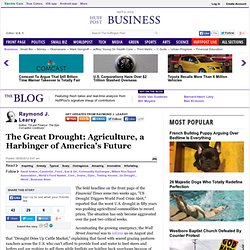
The situation has only become aggravated over the past two critical weeks. Accentuating the growing emergency, the Wall Street Journal was to inform us on August 2nd that "Drought Dries Up Cattle Market," explaining that faced with seared grazing pastures ranchers across the U.S. who can't afford to provide food and water to feed steers and heifers and are rushing to sell them while feedlots are holding back purchases because of the escalating price of feed corn.
Clearly, a disaster in the making. A disaster not only for food prices in the American market, but portending a food crisis worldwide. It is an act of nature that has unsheathed a fact of fundamental significance, but barely touched upon in either political nor civil discourse. Martha Rosenberg: Are You Eating Antibiotics Without Knowing It? Probably!
So far, 2012 is bringing bad news for people who don't want "free antibiotics" in their food.
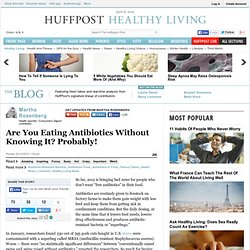
Antibiotics are routinely given to livestock on factory farms to make them gain weight with less feed and keep them from getting sick in confinement conditions. But the daily dosing, at the same time that it lowers feed needs, lowers drug effectiveness and produces antibiotic-resistant bacteria or "superbugs. " In January, researchers found 230 out of 395 pork cuts bought in U.S. stores were contaminated with a superbug called MRSA (methicillin-resistant Staphylococcus aureus). Worse -- there were "no statistically significant differences" between "conventionally raised swine and swine raised without antibiotics," reported the researchers.
So much for buying safely raised meat. Why would meat labeled "raised without antibiotics" be as full of superbugs as conventional and factory farmed meat? And days after the penicillin announcement, there was another concession. After the hearings, W. Marine Stewardship Council. Seafood Health Facts. Mark Hyman, MD: 10 Rules to Eat Safely for Life (and What to Remove From Your Kitchen) Every day you have to navigate a toxic nutritional landscape.
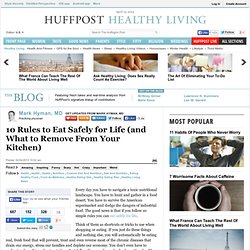
You have to hunt and gather in a food desert. You have to survive the American supermarket and dodge the dangers of industrial food. The good news is that if you follow 10 simple rules you can eat safely for life. Think of them as shortcuts or tricks to use when shopping or eating. If you just do these things and nothing else, you will automatically be eating real, fresh food that will prevent, treat and even reverse most of the chronic diseases that drain our energy, stress our families and deplete our economy. Ideally have only food without labels in your kitchen or foods that don't come in a box, a package or a can. That's it -- just 10 simple goof-proof rules for staying healthy for life. When you make these simple choices you will not only improve your health, and your family's health, but you will create a "wellness spring" that will shift the demand in the marketplace.
Now I'd like to hear from you: To your good health, Seven Foods Experts Won't Eat. The Cornucopia Institute. Is Nanotechnology The New GMO? 2011: Sustainable food trends. A good year-end trend list should do two things simultaneously: confirm the conscientious reader’s suspicions while providing a few surprise nuggets.
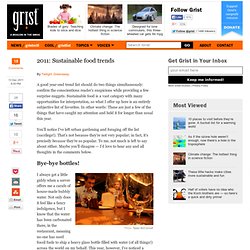
Sustainable food is a vast category with many opportunities for interpretation, so what I offer up here is an entirely subjective list of favorites. In other words: These are just a few of the things that have caught my attention and held it for longer than usual this year. You’ll notice I’ve left urban gardening and foraging off the list (sacrilege!). That’s not because they’re not very popular; in fact, it’s precisely because they’re so popular. To me, not much is left to say about either. Bye-bye bottles! Photo: Taylor McConnellI always get a little giddy when a server offers me a carafe of house-made bubbly water. Root-to-stem cooking Save watermelon rinds for pickling. Bugs on your plate! Questions About Organic Produce and Sustainability.
Organic food is not always sustainable food. Good food, as we've come to know it in the last few years, has a few characteristics: It's local.
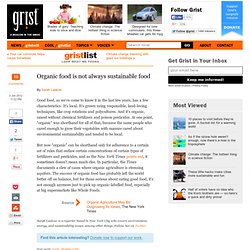
It's grown using responsible, land-loving techniques, like crop rotations and polycultures. And it's organic, raised without chemical fertilizers and poison pesticides. At one point, “organic” was shorthand for all of that, because the same people who cared enough to grow their vegetables with manure cared about environmental sustainability and tended to be local. But now “organic” can be shorthand only for adherence to a certain set of rules that outlaw certain concentrations of certain types of fertilizers and pesticides, and as the New York Times points out, it sometimes doesn't mean much else.
In particular, the Times documents a slew of cases where organic agriculture is stressing aquifers. FoodWatch. NON- GMO Shopping Guide. Which eco-friendly food labels are meaningful, and which are just hot air?